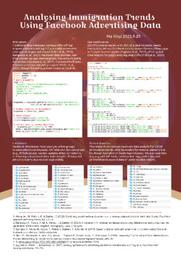Analysing Immigration Trends Using Facebook Advertising Data
Global migration are central to understanding contemporary societal transformations, economic development, and policy challenges. However, traditional data sources—such as national censuses, government reports, and surveys—often suffer from limitations, including high costs, delayed availability, and lack of real-time analysis. These constraints are particularly acute when studying highly dynamic phenomena like migration interests, where timely insights are critical.
In recent years, digital platforms have emerged as innovative sources of large-scale, real-time behavioral data. Facebook, with over 3 billion active users globally, offers a unique opportunity to explore human mobility and migration interests. The Facebook Ads Manager allows advertisers to target users based on demographics, location, language, interests, and behaviors—parameters that can estimate populations with specific migration-related backgrounds or intentions. For example, by targeting users interested in "immigration services," "language learning," or "international remittances," researchers can infer migration interests across regions.

The methodology of using Facebook Ads Manager for research aligns with advancements in computational social science but remains underexplored for migration studies. Unlike traditional surveys, Facebook's targeting capabilities enable the collection of real-time, large-scale data at a lower cost. This approach can complement official statistics by providing insights into hard-to-reach populations, such as irregular migrants or those in transition, who are often underrepresented in conventional datasets. Additionally, Facebook's granular targeting options—including geographic precision and linguistic preferences—allow for nuanced analyses of migration patterns. For instance, researchers can estimate the number of users in North America who speak Spanish.
Despite its potential, this method requires careful consideration of biases. Facebook's user base can’t be fully representative of the general population, and privacy changes can affect data precision. Moreover, interest-based targeting relies on Facebook's algorithms, which may not always capture migration intentions accurately. However, with validation by traditional data sources, these challenges can be mitigated.
This research project aims to harness Facebook Ads Manager to study global migration interests, addressing gaps in current methodologies. By designing targeted ad campaigns and analyzing aggregated estimates, we seek to:
- Identify regional hotspots of migration interest and correlate them with socioeconomic factors.
- Create a collaborative database for researchers and institutions to access real-time migration metrics.
- Validate the efficacy of digital advertising tools as a cost-effective alternative to traditional migration data collection.
The findings could revolutionize how migration trends are monitored, providing a foundation for future collaborations in academic, humanitarian, and policy contexts.


Please sign in
If you are a registered user on Laidlaw Scholars Network, please sign in